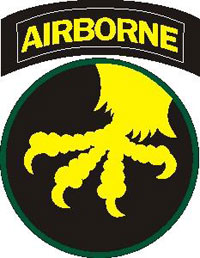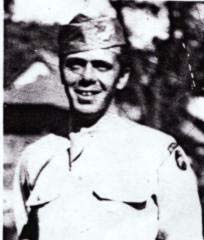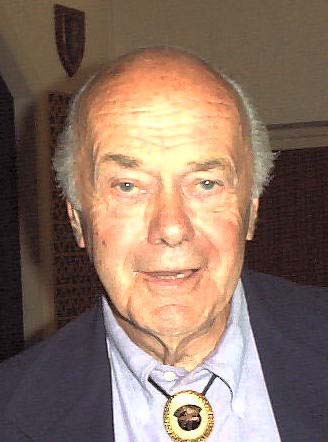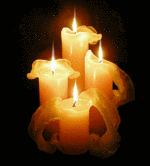
Joseph "Joe" Quade
|
|
|
It's with great sadness that I must inform you of the death of Joe Quade. He passed away on August 26, 2020. We should never forget that this man has done for us; Rest in Peace Joe thank you so much for our freedom. God Bless you! |
One very thank you to Joe Quade to have agreed to answer my very numerous questions! For his kindness and its availability!


Joseph "Joe" Quade was born on
August 22, 1923 in Elizabeth, New Jersey.
Joe had a twin brother Charlie and a younger brother, Bob. Joe has got German
roots. His father, Joseph Maxmillian Quade was born in New York, but his
grandfather was born in Berlin and immigrated to the United States in 1885.
“My father worked as a tour agent for the Union Pacific railroad.”
His mother, Myra Tetter Quade was born in Czechoslovakia and immigrated to the United States in the early 1900s.
“She was a homemaker all her life except during WWII when she worked as a clerk in a local factory.”
Joseph had a nice childhood,
and despite the Great Depression of 1929 the family could still live properly
thanks to his father’s job.
Joe and his brother Charlie used to enjoy
misleading their friends and their teachers with their likeness.Charlie also
took part in the war. He
volunteered for the Marines three months before Joe joined the army to become a
paratrooper.
“Charlie was wounded twice while serving in the South Pacific. He was a Marine sniper. Unfortunately he was killed in an auto accident in 1947.”
Joe was studying at Rutgers University when he was called up. We were then in 1943
“The war began in 1939 in Europe when I was a junior in High School. My family had relatives in Czechoslovakia so we had a "contact" with the war. We followed the action in Europe even though our Country was not in it. In 1941 my brother and I entered Rutgers University, but we realized that we would be going into the Service if the USA declared war which the country did in December 1941. All young men realized it would just be a matter of time. Then we both spent almost three years in uniform.”
Joe attended basic training at
Camp Fannin, Texas. He participated in the assessment of IQ tests and, thanks to
good results, was incorporated into the Army Specialized Training Program. He
studied at MIT (Massachusetts Institute of Technology). After six months, the
program was stopped and Joe was transferred to the regular army.
He joined Company E, 194th GIR which had ended maneuvers in Tennessee.
“I was ready to go back into the "real Army" so I was not upset about the change.”
When he found out Glidermen were not wearing a parachute, he volunteered for the paratroopers, more for adventure than really for the $ 50 bonus.
“I remember my first parachute jumps in training. The first was so easy; I landed standing up with no problem. I thought how easy it was to qualify as a paratrooper. The second jump was different. I landed so hard that I though my hip bones were coming up and around my ears. The fifth qualifying jump was at night. It was weird jumping off in the total darkness, not knowing when you were about to hit the ground. But I managed with out any ill effect.”
Then he was assigned to the 17th Parachute Maintenance Company, which required patience, intelligence, diligence and reliability.
“When they were setting up the Parachute Maintenance Company they wanted responsible men and since I had two years of college I was selected.”
On August 17, 1944, the men of the 17th Airborne shipped out for England fromton Harbor after a brief stint at Camp Miles Standish in Massachusetts.
The division arrived in
Liverpool, England on 26 August 1944 and Joe took up his quarters at Chilbolton
Air Base, New Winchester near Swindon on 30 August 1944.
Joe got a leave for London:
“As to London I got there a few times for two days. I remember Rainbow Corner, the dormitories they had for us to sleep and the Piccadilly commandos. Also the fish and chips wrapped in newspaper. They were delicious.”
During December, while Joe’s
Division was still stationed in England, the Germans launched their major
offensive towards the port of Antwerp. The American troops stationed in the
Ardennes were totally surrounded by surprise. Once General Eisenhower learned
the news, it was the action-stations. The 17th Airborne, one of the few
divisions still held in reserve was sent to the front.
Joe Quade would know his baptism of fire.
“We had no stated mission when we flew over from England. We did not know it was a Bulge. We just knew that the Germans had advance and it was our job to push them back. Day after day we were told to move forward and hold the line. I was lucky that I was not wounded by gun fire. But frozen feet were always a problem.”
Joe participated in the Ardennes and Rhine Campaigns along the borders of the Reich.
“After the Bulge when we went back to Chalons in preparation for Operation Varsity, I was in charge of a small group of German prisoners on a work detail. They were ordinary soldiers as we were, so I had no hatred towards them.”
During the preparation of Operation Varsity, Joe Quade who was part of the 17th Parachute Maintenance Company joined its warehouses preparation.
“I was assigned to the parachute maintenance Company while in the States. In Chalons, we had the job of getting all the thousands of parachutes, both for the troopers and for the supplies, ready for the jump into Germany. We worked long hours seven days a week.”
As he was an experienced paratrooper, Joe Quade participated in Operation Varsity, jumping with paratroopers of the 513th PIR.
“We jumped with the 513th and moved forward with them for a few days. Then we were ordered to go back to the drop zone and salvage what chutes we could. There was not much left since the German civilans had stolen most of them.”
From this time, he did not get back to the front lines
“I was assigned to the PM Company before we left the USA for Europe and was permanently assigned to them until the end of the war. On March 24th the members of the PM Co. were split up and assigned to jump with the 513th. After a few days we were sent back to France to prepare the chutes in case they were needed for another jump. In June 1945, I was assigned to the 13th AB Division was slated to go to the Pacific to fight the Japs but on the ship to New York the Japs surrender and thus we did not have to go there. We handed in New York and were given a 30 day leave. My parents and friend s were happy that I came home safe. I was discharged at the end of December.”
Once he left the army,
Joe completed his studies at Rutgers University where he received his diploma.
Then he carried on to study at Cornell University to do a Business Master.
In 1949 he was hired by the Prudential Insurance Company where he joined the
research sector and also various management positions including human resources,
operational and information technology. In 1986, he retired. He carried on his
activities in the humanitarian and socio-cultural. Joe was named Citizen of the
Year by his hometown of Montville, New Jersey. He was also awarded with the
Humanitarian Award from the Prudential Insurance Company with 25 other people
among 15,000 employees in gratitude for his many contributions.
Among the affiliations of Joe in different communities and civic role we must
mention his role as a leader in the Boy Scouts, Girl Scouts, the United Way,
Library Boards, the Recreation Commissions, the American Legion, the VFW, the
Heart Fund, the Republican Party, Little League, the Board of Education,
Community Education as well as being Past President of the 15,000 members of the
Prudential Insurance Company Athletic Association.
Since he retired, he became a substitute teacher in a school, giving courses,
including algebra, coaching football and even became a soccer referee.
But among all his activities and dedication, the most important is that he was
one of the co-founders of the 17th Airborne Division Association in 1953 and its
ninth president in 1962 after one of the most successful reunions which took
place in New York.
However, his most accomplished role was the work as a editor of the new channel
of communication of the 17th Airborne, the excellent "Thunder From Heaven
newsletter”, a position he held for nearly 40 years since 1969. So busy he could
be,he is also the co-chairman of the Meeting Site Selection Committee and a
member of the Memorial Committee and the designer and publisher of the annual
calendar of the 17th Airborne.
And as if he still had enough time between his hands, he is also an experienced
traveler, he returned to visit with the veterans the places where there were
airborne troop formations, places of battle during the Second War. He led
pilgrimages to be with foreign paratroopers in China, Japan, Korea, Poland,
Czechoslovakia, Hungary, Russia, Australia, New Zealand, Germany, France,
Belgium, Holland, Luxembourg and England.
And he has a great family life with his wife Suzi, his son Jeff and his daughter
Kim. He also has two Grand Children, Cormac and Penelope.
“At age 86, I have no regrets. It was a good
experience and a good life. I was no hero. I just did, as a Private First Class,
what I was told to do.”
